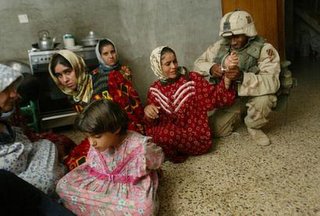Saturday, November 26, 2005
It keeps the men happy... posted by Richard Seymour

The revelation that the US has been running a mini-Guantanamo prison in Kosovo may not be a surprise to any of those who remember the involvement of UNMIK and K-FOR in the dramatic escalation of sex-slavery in the 'protectorate'. Not to mention in Bosnia where DynCorp, a private military contractor with close links to the US government was found to have been involved in sex-slavery. (The same company is running security operations in Iraq, Afghanistan and the US-Mexico border, while also piloting the aircrafts that dump poison on Colombian farmland. Dyncorp was also charged with the task of protecting Aristide, who had disbanded the Haitian army, which is why he was so easily deposed, and they have since trained the new national police force, bringing several Tonton Macoutes leaders back into state power).
 Similarly, in South Korea, where US troops are stationed, the International Organisation for Migration reports that local US military commanders have forged agreements with local business and government to promote a prostitution complex in camp-towns, based on the enforced trafficking of sex slaves from former Soviet states and the Phillipines. The idea, it seems, is to "keep the men happy". This is one often neglected widespread consequence or corrollary of US imperialism:
Similarly, in South Korea, where US troops are stationed, the International Organisation for Migration reports that local US military commanders have forged agreements with local business and government to promote a prostitution complex in camp-towns, based on the enforced trafficking of sex slaves from former Soviet states and the Phillipines. The idea, it seems, is to "keep the men happy". This is one often neglected widespread consequence or corrollary of US imperialism:Feminist anthropologists such as Cynthia Enloe have documented how the U.S. military perpetuates the sexual commodification of women around military bases both in the U.S. and abroad, to manage and motivate its largely male workforce. Additionally, we must analyze collusion between foreign and indigenous patriarchies under imperialism in exacerbating women's oppression.
Following a pattern observed across different conflict regions by feminist scholars, Iraqi women face increasing pressures to earn their subsistence from men by bartering their sexuality. This is due to a lack of other economic options under both military attack and oppressive gender relations. In Baghdad, prostitution reportedly became widespread between the fall of the Hussein administration in April 2003 and November 2003, as women disproportionately suffered growing poverty. Today, reports have surfaced of young Iraqi teens working in Syrian brothels, after being displaced from Fallujah where U.S. forces launched brutal offensives and chemical weapons attacks on civilians. Sexual violence, as well as the trafficking of Iraqi women and girls, showed horrific rises almost immediately after the invasion and continue. While initially perpetrated largely by Iraqi men, these rapes and abductions were exacerbated by the occupation force's negligence and inability to establish security -- its priorities, afterall, have been to secure the oil.
The U.S. anti-war left was in general embarrassingly unsure how to address such violence, inconveniently at the hands of Iraqis rather than U.S. forces -- let alone suggest an adequate remedy which might have direct effects on the problem, besides calls for a (male-led) resistance to replace the occupiers. But an understanding of the gender dynamics typical of wartime economies would press the need to provide solidarity for Iraqi anti-occupation movements for women's rights. The U.S. anti-war movement largely has not treated freedom from sexual violence as a human right equal to Iraqi struggles for food, water, shelter, or healthcare. Meanwhile, as the occupation persists, with growing contact between military forces and Iraqi civilians, sexual brutality by both U.S. troops and Iraqi police under occupation authority has increased.
Jennifer Fasulo is co-founder of Solidarity with Organization of Women's Freedom in Iraq (SOWFI), a U.S.-based group providing political support to an anti-occupation, feminist women's group in Iraq. She reminds us of the specific historical and geopolitical context of the occupation, pointing out that the conflict has intensified the growing religious fundamentalist movement in Iraq -- opposed by Iraqi feminists and socialists -- including segments that systematically perpetrate violence against and harassment of women. The rise of Islamist fundamentalism throughout the Middle East is not merely indigenous, but has its roots in U.S. support, which recruited Islamist militias as opposition to secular, democratic, and socialist movements throughout earlier decades.
Militarization helps perpetuate sexual violence, domestic violence, and violence against women -- both in the U.S. and Iraq.
Even though women serve as soldiers, the U.S. military is a misogynist, homophobic institution that relies on patriarchal ideologies and relations to function -- with effects on larger society, as well as the countries we occupy or station bases. While the racist ideologies behind the war are regularly paid lip service by activists, we less frequently raise how this war depends on sexism. But the military and its public support are based on deeply embedded patriarchal values and practices.
The U.S. military trains men to devalue, objectify, and demean traits traditionally associated with women. It molds men into a gender role of violent masculinity defined in opposition to femininity. By "violent masculinity" I mean a mode of operating that glorifies violence as a solution to tension and that casts civilians in general and women in particular as objects of soldiers' "protection" who are not equal to the masculine "protectors." As Lutz observes, militarism teaches us to "prove and regenerate ourselves through violence.”
One soldier reported his training in boot camp:
"Who are you?" "Killers!"
"What do you do?" "We kill! We kill! We kill!"Furthermore, soldiers are purposefully trained to eroticize violence -- from a heterosexual, male-aggressor perspective, even if some soldiers are gay and some are women. For example, during the first Gulf War, Air Force pilots watched pornographic movies before bombing missions to psyche themselves up. Until 1999, hardcore pornography was available at military base commissaries, which were one of its largest purchasers.
The military teaches soldiers to internalize the misogynistic role of violent masculinity, so they can function psychologically. At the 2003 Air Force Academy Prom, men were given fliers -- using taxpayer dollars -- which read, "You Shut the Fuck Up! We'll Protect America. Get out of our way, you liberal pussies!" They were then treated to a play which provided instructions on how to stimulate a female's clitoris and nipples to get her vaginal juice flowing (in case she was otherwise unwilling?).
Alarmingly but not so surprisingly, according to the Veterans Association itself, over 80 percent of recent women veterans report experiencing sexual harassment, and 30 percent rape or attempted rape, by other military personnel. Crimes of sexual violence by military personnel are shocking -- and institutionally ignored. Lawyer Dorothy Mackey of Survivors Take Action Against Abuse by Military Personnel (STAMP) reports that of the 4,300 sexual assault and abuse cases she is handling which were brought up to military and government officials, only 3 were actually prosecuted. In Mackey's own experience as a survivor of repeated sexual assault by military personnel, her attempt to press charges was opposed by the Department of Justice as a threat to national security.
Military service may be more conducive to domestic violence than most civilian occupations, owing to the military's authoritarianism, use of physical force in training, and the stress of frequent moves and separations as factors. The incidence of domestic violence in the military is far higher than in the civilian world:
CBS News' 60 Minutes report estimated that the rate of domestic violence in the military is five times that in the civilian population. The recent report says only that among 700,000 military families, incidents reported to military agencies are down from 22 per 1,000 couples in 1997 to 17 per 1,000 in 1999. The military figures do not count unmarried "intimate partners," which are included in most civilian studies.
Current studies by Richard Gelles of the University of Pennsylvania, among others, estimate domestic violence in the military is at least two to three times higher than among civilians.
Might the military's institutional sexism and indifference to violence against women be a factor? A checklist used by the military to determine if rape reports are valid lists a women's financial problems with her partner and "demanding" medical treatment, as factors indicating she's lying. The Army recently offered the perk of free breast implants for servicewomen, so its surgeons could "get practice." Meanwhile, it has a drastic shortage of rape kits in combat regions and refuses to pay for servicewomen's abortions even in the case of rape.
A therapist who practices near a large Army Base and treats soldiers returning from Iraq reports that domestic violence has escalated ever since troops began coming back. Even more disturbing, she says, "The soldiers tell me that the killing of spouses at military bases is at an all time high, but I have no concrete evidence to this effect, and the Army is pretty quiet about it." She also mentions "a dramatic increase in sexual addiction" among soldiers, as they are compelled to substitute solitary enjoyment of pornography for sexual relationships in war zones, "to the detriment of interaction with another."
Militarism's patriarchal roles extend into larger culture, not just ideologically in terms of how little boys broadly are taught to be soldiers -- but institutionally as well. Phoebe Jones of Global Women’s Strike and Survivors Take Action Against Abuse by Military Personnel (STAAAMP) places the Abu Ghraib scandal in the context of a prison-military complex of abuse:It's all connected. . . . You have prison guards here, like Charles Grainer [implicated in the Abu Ghraib abuse scandal], who go to Iraq and abuse people there. Then you have soldiers come back from Iraq or Afghanistan getting jobs as prison guards, and they rape and abuse people. The military could stop it if they want to, but they don’t want to. They’re socializing men into doing this.
Prison torture was outsourced to U.S. companies using personnel from domestic prisons. Beyond the prison-military complex, the impact of rape culture nurtured by the military can be traced through U.S. society further. In 1997, "about 35% of veterans in State prison, compared to 20% of nonveterans, were convicted of homicide or sexual assault" -- in fact, the number one reason for veterans to be in prison at the state level was for sexual assault.
Huibin Amee Chew










